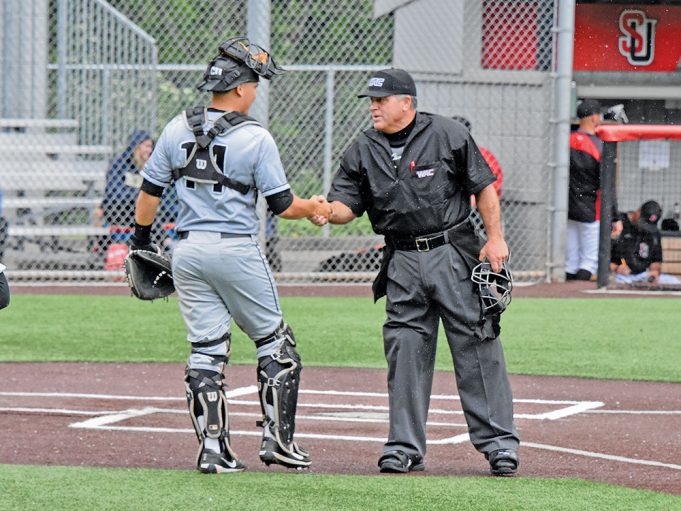An umpire buddy was planning a presentation to a high school umpires association on how to advance to the college level and asked me for some thoughts. The following is what I sent him, which is based on several decades of working onfield at the minor league and Division I levels and serving as a Division I umpire coordinator.
1. Appearance.
I won’t dwell on this topic for it is often addressed in this magazine, except to say that if I’m considering several prospects for a staff opening, it’s easy to eliminate those who aren’t flat-bellied and don’t look like they’re athletic. Maybe this isn’t fair, but it is reality in this day and age.
2. Don’t be too eager.
Some umpires want to advance before they’re ready. One thing I focused on when watching umpires work was whether they could maintain a consistent strike zone for nine innings, regardless of what happened. You can’t learn to do this overnight. It takes roughly five years at any level to develop a consistent, solid zone.
I also wanted to see how an umpire controlled the game and whether he could turn the page instantly if he blew a pitch or call or the crowd hooted at him. It takes several years in the saddle to learn how to do this. Be patient and take things a step at a time. If you happen to get a college game or schedule, but screw up because you don’t yet know the ropes, you may not get a second chance. I’ve seen this happen many times.
If working college scrimmages is an option, do it. Balls and strikes are where it’s at, so get behind the plate. Be objective about your work; maybe ask for feedback from the pitching coach afterward. Although scrimmages are not pressure situations, it should give you a sense of whether you can handle that level.
3. Network.
People won’t come knocking at your door asking you to umpire for them. You must put yourself out there if, objectively, you think you’re ready to advance. Submit letters of interest to the proper people. Let people you work with who may be in a position to “talk you up” to those at the next level know of your desire to advance. Many umpires have gotten a chance at a higher level because a partner who was already there put in a good word. Go to camps. (But don’t even hint that you’re there just to advance; this is a royal turn-off.) Be careful, however, not to come across as a suck-up. No coordinator has any use for real or perceived phonies.
4. Sound out veterans.
Veterans may not look the part or be on top of rules or mechanics, but they’ll know things that books and PowerPoints don’t teach. If you get a chance to soak up their wisdom, take it. Incorporate what you like into your repertoire and discard the rest. When I started out, I learned as much from the old-timers as I did in clinics and chapter meetings.
5. Be humble.
Don’t fight your assigners and gripe about assignments. Other umpires may be as good as you are. Take constructive criticism without protest; it can be a career-killer to be branded as the guy who always has an excuse or comeback when someone in authority tries to tell him something. Don’t turn back games unless you have to. For you to become a headache to an assigner gives an easy excuse to skip you over when the plum games come around.
6. Call strikes.
No one likes a walk parade, so call marginal pitches strikes, especially at the bottom of the knees (not the shins), where pitchers try to live, and on the corners. Don’t get hung up on how the catcher presents the ball. You can’t ring up strikes when they make a pitch look really bad, such as by reaching across their body or dropping to their knees to catch it, but otherwise don’t penalize a pitcher for subpar mitt work. This isn’t pro ball, where umpires won’t call a strike if, for example, the catcher turns his mitt down to catch a knee pitch.
I always said that when a pitch left the pitcher’s hand, I assumed it was a strike unless it convinced me otherwise. You won’t advance with a coffee-can-sized strike zone.
7. Don’t get lax.
Work as if someone who can help you is in the stands; in the case of many umpires, someone was. The late AL umpire Steve Palermo, one of the very best ever, got his start because the head of the Umpire Development Program happened to see a Little League game he worked, thought he had potential, and recommended that he go to umpire school.
8. Take care of business.
Know the rules, apply them with common sense and in light of their intent, and adhere to the prescribed mechanics. Have the guts to do what you’re supposed to do even if you get yelled at. And don’t let the troops run the show. If you don’t take charge — without being confrontational or overly aggressive — you’ll never gain anyone’s respect.
9. Always have your partner’s back.
If, for example, they have to eject someone, don’t stand aside and let them try to handle the aftermath. That has happened to me, and it wasn’t pleasant in the dressing room afterward.
10. Integrity.
Don’t trash talk umpires behind their back. You may think that dropping hints with an assigner about what another umpire did wrong may make you look better, but trust me, it doesn’t. If you screw up, own up to it. An umpire on my staff once called me after a game to say that he ejected a coach when he shouldn’t have. That earned tons of plus-points with me.
Lots of umpires today are competing for a limited number of collegiate umpiring slots. The amateur aspirant finds it harder with so many pro umpires coming to the college ranks after not surviving the minor league up-or-out system. Points like the ones above (and there are many others) may help you to set yourself apart from others and be attractive to a college umpire assigner or coordinator.
What's Your Call? Leave a Comment:
Note: This article is archival in nature. Rules, interpretations, mechanics, philosophies and other information may or may not be correct for the current year.
This article is the copyright of ©Referee Enterprises, Inc., and may not be republished in whole or in part online, in print or in any capacity without expressed written permission from Referee. The article is made available for educational use by individuals.


















